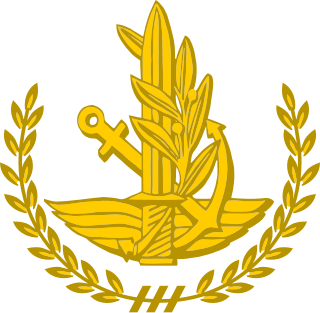
Yitzhak Rabin was an Israeli politician, statesman and general. He was the fifth prime minister of Israel, serving two terms in office, 1974–1977, and from 1992 until his assassination in 1995.

Shimon Peres was an Israeli politician and statesman who served as the eighth prime minister of Israel from 1984 to 1986 and from 1995 to 1996 and as the ninth president of Israel from 2007 to 2014. He was a member of twelve cabinets and represented five political parties in a political career spanning 70 years. Peres was elected to the Knesset in November 1959 and except for three months out of office in early 2006, served as a member of the Knesset continuously until he was elected president in 2007. Serving in the Knesset for 48 years, Peres is the longest serving member in the Knesset's history. At the time of his retirement from politics in 2014, he was the world's oldest head of state and was considered the last link to Israel's founding generation.

Amnon Lipkin-Shahak was an Israeli military officer and politician. He served as Chief of Staff of the Israel Defense Forces, as a Member of the Knesset, and as Minister of Transportation and Minister of Tourism.

Yitzhak "Itzik" Mordechai is an Israeli former general and politician. He served as a member of the Knesset between 1996 and 2001, and as Minister of Defense and Minister of Transport. He retired from political life after being indicted for sexual assaults during his military service and later periods.

The Center Party, originally known as Israel in the Center, was a short-lived political party in Israel. Formed in 1999 by former Defense Minister Yitzhak Mordechai, the aim was to create a group of moderates to challenge Benjamin Netanyahu on the right and opposition leader Ehud Barak's Labor Party on the left.
Chartzufim or HaChartzufim was an Israeli political satire television programme in the vein of Britain's Spitting Image. It ran from 1996 to 2001 on Channel 2.

The Chief of the General Staff, also known as the Commander-in-Chief of the Israel Defense Forces, is the professional head of the Israel Defense Forces (IDF). The current Chief of the General Staff is Herzi Halevi.

Gesher, officially the Gesher National Social Movement, was a political party in Israel between 1996 and 2003. It formed when David Levy led a split from the Israeli center-right party Likud. Gesher helped to form coalition governments led by both Likud and the left-wing Labor Party, but never gained significant power. The party was eventually disbanded as Levy returned to Likud. In 2019, David Levy's daughter, Orly Levy set up a similar party named Gesher, which advocates for many of the same policies supported by her father.

The assassination of Yitzhak Rabin, the fifth prime minister of Israel, took place on 4 November 1995 at 21:30, at the end of a rally in support of the Oslo Accords at the Kings of Israel Square in Tel Aviv. The assailant was Yigal Amir, an Israeli law student and ultranationalist who radically opposed prime minister Yitzhak Rabin's peace initiative, particularly the signing of the Oslo Accords.
Legislative elections were held in Israel on 17 May 1977 to elect the ninth Knesset. For the first time in Israeli political history, the right wing, led by Likud, won a plurality of seats, ending almost 30 years of rule by the left-wing Alignment and its predecessor, Mapai. The dramatic shift in Israeli politics caused by the outcome led to it becoming known as "the revolution", a phrase coined by TV anchor Haim Yavin when he announced the election results live on television with the words "Ladies and gentlemen—a revolution!". The election saw the beginning of a period lasting almost two decades where the left- and right-wing blocs held roughly equal numbers of seats in the Knesset.

The Dollar Account affair was a political scandal in Israel in 1977, following the exposure of an illegal United States bank account held by Israeli Prime Minister Yitzhak Rabin and his wife Leah. It led to Rabin's de facto resignation from the government.

David Libai was an Israeli jurist and politician. He was a member of the Knesset for Labor from 1984 to 1996 and served as minister of justice from 1992 to 1996.

Ori Orr is an Israeli retired general and politician. During his service with the Israel Defense Forces, he headed the Central and Northern Commands. Afterward, he was elected to the Knesset twice for the Labor Party. He chaired the Foreign Affairs and Defence Committee and was appointed Deputy Minister of Defence.
Events in the year 1998 in Israel.
Events in the year 1996 in Israel.
Events in the year 1995 in Israel.
Events in the year 1993 in Israel.

The Israeli Peace Initiative is a compromise plan given by the political left within Israel in response to the Arab Peace Initiative issued by the Arab League in 2002 and again in 2007. It was released on April 6, 2011. It compromises with the Palestinians in an effort to establish peace in Israel. One of the key differences from other peace plans is that the Israeli Peace Initiative proposes a complete withdrawal of Israeli forces from the Gaza Strip and the West Bank. It also calls for the establishment of the Temple Mount as neutral ground between Palestine and Israel, and the retention of the Jewish Quarter of the Old City within Israel. Additionally, the peace plan addresses Israel's relations with its Arab neighbors, including settling the dispute over the Golan Heights, territory that Israel captured from Syria in the Six-Day War.
Events in the year 2012 in Israel.














